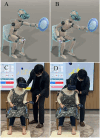Impact of somato-cognitive coordination therapy on activities of daily living in a patient with Huntington's disease
- PMID: 39631922
- PMCID: PMC11660046
- DOI: 10.1136/bcr-2024-262695
Impact of somato-cognitive coordination therapy on activities of daily living in a patient with Huntington's disease
Abstract
Huntington's disease (HD) causes progressive neurodegeneration, impairing activities of daily living (ADL). Treatment focuses primarily on symptomatic relief through multidisciplinary approaches. This case report examines the impact of somato-cognitive coordination therapy (SCCT) on ADL in a patient with HD. A woman in her 40s with early-stage HD underwent 22 SCCT sessions using the mediVR KAGURA (mediVR), a virtual reality technology-based medical device over 20 months. Her total functional capacity rating scale improved from 10 to 11 and her Barthel Index improved from 90 to 100 within 3 months, allowing her to continue working. These improvements were sustained for 17 months. Objective measures like the single-leg stance test showed consistent progress. Improved cognitive function and psychiatric well-being were also suggested by the Trail Making Test and a return to hobbies like hiking. SCCT may have the potential to improve ADL and could complement multidisciplinary care strategy for HD patients.
Keywords: Cognitive behavioural psychotherapy; Movement disorders (other than Parkinsons); Neuro genetics; Parkinson's disease.
© BMJ Publishing Group Limited 2024. No commercial re-use. See rights and permissions. Published by BMJ.
Conflict of interest statement
Competing interests: mediVR KAGURA is a medical device of mediVR, Inc. MH is a director and holds private equity in mediVR, Inc. KS and YT are full-time employees of mediVR, Inc. mediVR, Inc. runs the mediVR Rehabilitation Center. MH is a director and holds private equity in mediVR, Inc. KS and YT are full-time employees of mediVR, Inc. The lead clinician has ensured the veracity of all author declarations of conflict of interest and author disclosures.
Figures
Similar articles
-
Survey of the Huntington's Disease Patient and Caregiver Community Reveals Most Impactful Symptoms and Treatment Needs.J Huntingtons Dis. 2016 Dec 15;5(4):395-403. doi: 10.3233/JHD-160228. J Huntingtons Dis. 2016. PMID: 27983566
-
Cognitive-behavioural therapy with a Huntington's gene positive patient.Patient Educ Couns. 2003 Feb;49(2):133-8. doi: 10.1016/s0738-3991(02)00070-8. Patient Educ Couns. 2003. PMID: 12566207
-
Cognition, function and awareness of disease impact in early Parkinson's and Huntington's disease.Disabil Rehabil. 2022 Mar;44(6):921-939. doi: 10.1080/09638288.2020.1783001. Epub 2020 Jul 3. Disabil Rehabil. 2022. PMID: 32620060
-
[Rehabilitation in Huntington's Disease].Fortschr Neurol Psychiatr. 2015 Jun;83(6):334-43. doi: 10.1055/s-0035-1553092. Epub 2015 Jun 22. Fortschr Neurol Psychiatr. 2015. PMID: 26098083 Review. German.
-
The effects of cognitive behavioral and mindfulness-based therapies on psychological distress in patients with multiple sclerosis, Parkinson's disease and Huntington's disease: Two meta-analyses.J Psychosom Res. 2019 Jul;122:43-51. doi: 10.1016/j.jpsychores.2019.05.001. Epub 2019 May 13. J Psychosom Res. 2019. PMID: 31126411 Review.
References
Publication types
MeSH terms
LinkOut - more resources
Full Text Sources
Medical


